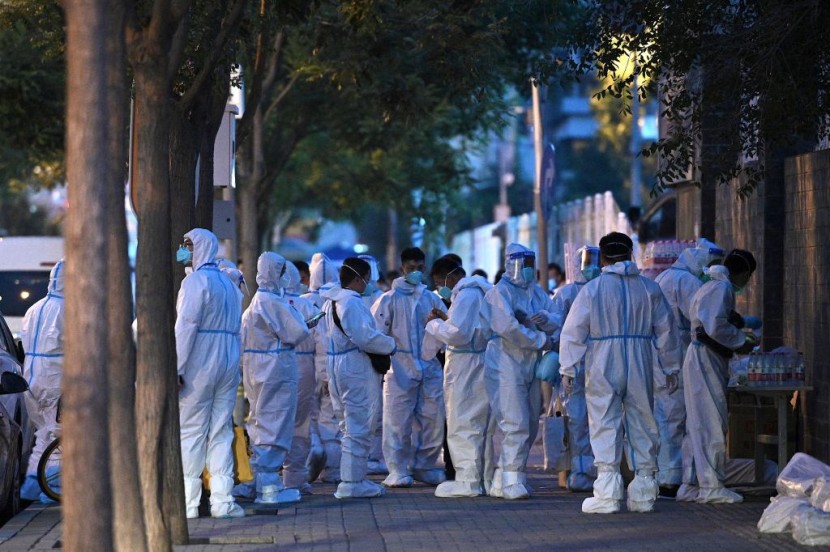
Authorities in Shanghai said on Tuesday that they had reached zero-COVID-19 at the community level in what appeared to be a watershed moment in a painful and costly campaign to contain an Omicron outbreak, but many residents remain skeptical that the city will resume anytime soon.
Since China's leader Xi Jinping pledged to stick to his zero-COVID-19 policy on May 5, Shanghai authorities have stepped up their efforts, canceling food deliveries in some areas, placing residents who tested negative for COVID-19 in government quarantine, and disinfecting their homes without their consent.
China's Shanghai Nears Its Aim To End COVID-19 Lockdown
While the harsh measures have exacerbated locals' anger, they also appear to have reduced illness rates. On both Sunday and Monday, Shanghai recorded less than 1,000 new cases for the first time.
The news comes a day after Shanghai committed to progressively relaxing its COVID-19 lockdown and returning to normalcy in June, following a seven-week government-imposed halt that caused enormous suffering and a severe economic hit to the city.
Shanghai officials announced the pandemic to be under effective control during a news conference on Monday, claiming that 15 of the city's 16 districts had stopped the spread of COVID-19 in the community, with fewer than 1 million of the city's 25 million citizens remained under rigorous lockdown.
The city will reopen in three phases to restore normalcy and completely resume manufacturing by June. Supermarkets, convenience stores, and pharmacies reopened on Monday, as per Deputy Mayor Zong Ming, who added that hair salons and wholesale agricultural markets would follow, according to CNN.
Shanghai Is Unconvinced
Shanghai's top goal will be to resume industrial output and manufacturing, followed by a commercial enterprise, according to Deputy Mayor Zong Ming. Anti-pandemic measures will remain in place to prevent a relapse, but grocery shops, pharmacies, and convenience stores will be permitted to operate this week, as will in-person teaching at select schools.
From Monday, private automobiles and taxis will be permitted on the streets, and limited public transportation will return on May 22. Some Shanghai residents, however, were skeptical of the statement, having been disappointed in the past by shifting dates for the relaxation of restrictions.
Many areas and even buildings have been placed under a rigorous lockdown, with police and city personnel installing physical obstacles, fences, and even roadblocks to prevent people from moving. Several business doors still have police seals on them. Much of this infrastructure will now have to be removed by authorities. According to other sources, if local cases are discovered after routine testing, lockdowns of certain buildings and compounds may persist, Al Jazeera via MSN reported.
China's unemployment rate increased to 6.1 percent in April, the highest level since the early stages of the COVID-19 pandemic in February 2020. It comes as the world's second-largest economy is experiencing a significant slowdown due to spreading lockdowns.
Retailers and manufacturers were also heavily impacted, according to official statistics. In March and April, full or partial lockdowns were implemented in dozens of locations, including a lengthy shutdown of Shanghai's business center. Following the greatest outbreaks of the virus since 2020, Chinese Premier Li Keqiang recently called the country's job condition difficult and dismal. Nonetheless, the administration hopes to keep the unemployment rate below 5.5 percent for the entire year.
The Chinese economy was shut down, resulting in a surge in unemployment. Retail sales in China decreased by 11.1 percent in April compared to the same month last year, the worst loss since March 2020, according to the National Bureau of Statistics.
That was far worse than the 3.5 percent decrease in March, and it fell short of experts' projections of a 6.1 percent drop. At the same time, industrial production declined 2.9 percent year over year as supply chains were disrupted by steps to stem the spread of the coronavirus. That was the worst drop since February 2020, and it reflected a reversal of March's 5% increase.
In the clearest timeline yet, Deputy Mayor Zong Ming stated that the reopening of the financial, manufacturing and commercial hub will take occur in stages, with mobility restrictions primarily in place until May 21 to prevent an outbreak of illnesses, then gradually lessening, as per BBC.
Related Article : China Jobless Rate Hits Near Pandemic Peak Level As Lockdown Extends








